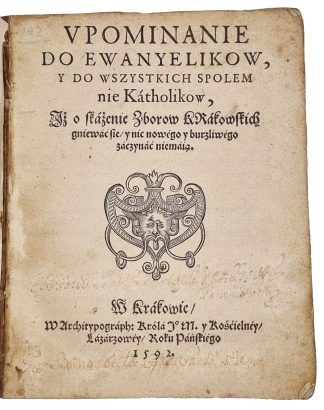SKARGAS, Piotr.
POLEMIC IN POLISH
Upominanie do ewanyelikow, y do wszystkich spolem nie Katholikow.
Kraków, Jan Januszowski, Drukarnia Łazarzowa, 1592.£4,250.00
FIRST EDITION. 4to. pp. 88. Szwabacher and Roman letter. Printer’s woodcut device to title, decorated initials. Slight browning, early ms ownership ‘Pro Bono Eccl[esi]ae (?) Sanct[orum] (?)’ and another c.1700 to title washed (with resulting tiny hole), purple ink stain to foot of last 4 ll. A good copy in paper wrappers, a few contemporary ms Latin marginalia and underlinings.
A good copy of the first edition of this rare and important vernacular polemic in defence of Catholicism, with contemporary annotations. The Polish preacher Piotr Skargas (1536-1612) was the first rector of the Jesuit Academy at Vilnius, professor at the Krakow College, and a major Counter-Reformation figure in the Polish-Lithuanian Commonwealth. ‘Undoubtedly, [he was] the most widely read Renaissance writer during the C18 [in Poland]. His devotional materials and sermons were among the most published works from the C16 through the C19’ (Althoen, p.518). In addition to popular vernacular books, he wrote polemical pamphlets on Polish religious controversies. ‘Upominanie’ – a ‘warning’ – is addressed to Evangelicals and ‘other non-Catholics’, at a time of religious unrest and Catholic persecution of dissidents and ‘heretics’, such as Lutherans and Socinians, through the destruction of places of worship, attacks on funerals and the plundering of graves (Wilbur, p.443). ‘Upominanie’ was written in the aftermath of the demolition of the first Evangelical Church in Krakow, established in St John’s Street in 1572. Skargas remembers how ‘thousands’ gathered to attack ‘dozens’ of heretics. The remainder of the work is a harsh critique of the reasons for this unrest: i.e., the General Act passed by the Warsaw Confederation in 1573, recognising freedom of religion for nobles and freemen within the Commonwealth. The contemporary annotator was especially interested in the explanation of the Act, which, according to Skargas, ‘gave freedom to all false prophets’. He glossed or highlighted arguments against the Act based on Old Testament and Patristic passages on early Christian heresies: e.g., how the Lutherans, Evangelicals (including a substantial community of Scottish merchants who had settled in Krakow), Arians and Calvinists are just like the Turks, and why fight against the latter and not the former; the activities of the Jesuit College in Vilnius; and the position of the king. Part II considers Catholics’ behaviour towards ‘heretics’, ‘false ministers’ and ‘false prophets’, especially concerning the sacraments.
Jan Januszowski brought Polish printing in line with the best practice of great European presses like Plantin’s. He devised the first original Polish type (Szwabacher), officially presented in 1594 but already in use, as here.
Only one copy recorded, at the Nat. Lib. of Poland. USTC 242909; Estreicher XXVIII, p.155. D. Althoen, That Noble Quest (2001); E.M. Wilbur, A History of Unitarianism (1945); W. Kowalski, ‘The Reformation and Krakow Society, c.1517–1637’, Stadt und Reformation (2019), pp.129-49.In stock




